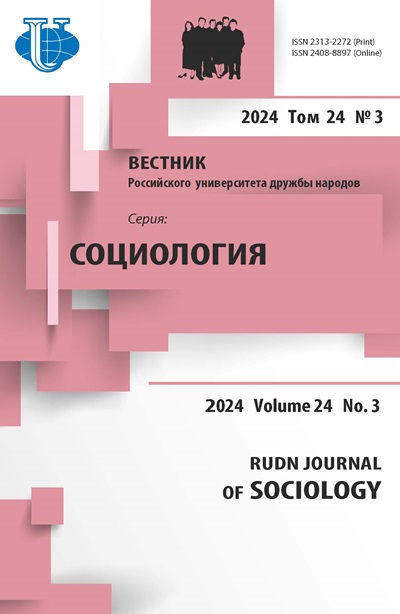ВЗАИМОДЕЙСТВИЕ СФЕР ОБЩЕСТВА КАК ТИПОВ СОВМЕСТНОЙ ДЕЯТЕЛЬНОСТИ ЛЮДЕЙ
- Авторы: Науменко ТВ1
-
Учреждения:
- Московский государственный университет им. М.В. Ломоносова
- Выпуск: Том 17, № 3 (2017)
- Страницы: 373-386
- Раздел: Социологический лекторий
- URL: https://journals.rudn.ru/sociology/article/view/16809
- DOI: https://doi.org/10.22363/2313-2272-2017-17-3-373-386
Цитировать
Полный текст
Аннотация
Статья посвящена актуальной и злободневной теме, связанной с исследованием общества и его составных частей. Этой теме посвящены многочисленные как междисциплинарные, так и узкоспе-циальные исследования. Однако понимание сущности общества возможно только через примене-ние к нему методов общей социологии, а также социальной философии, которая привносит в науку видение исследуемого объекта через призму всеобщего. С учетом этого в статье рассматривается проблема анализа общества с применением методов системного и деятельностного подхода как объяснительного принципа, распространяющегося на конкретные социальные процессы и общество в целом. Применение этих методов позволяет выявить сущность общества, в основе которой лежит деятельность преследующего свои цели человека. В статье особое внимание уделяется проблеме специфики общественных отношений и их отличиям от области природных явлений. Акцентируется роль ценностного измерения социальных фактов, их субъектной сущности, а также свободы как способности человека контролировать внешние обстоятельства в процессе индивидуального и кол-лективного целедостижения. При анализе структуры деятельностного ряда и его главных компо-нентов автором рассматриваются четыре типа совместной деятельности людей, а также уточняется соответствие этих типов общеизвестным сферам общества. Уточняется категориальный аппарат анализа сфер общества, способствующий более корректно структурировать все виды деятельности. Обосновывается некорректность выделения экономической сферы в отдельную структуру и дока-зывается присутствие экономических элементов во всех сферах общества. Выявляется механизм взаимодействия всех типов совместной деятельности людей и всех сфер общества, их взаимо-связь и взаимовлияние, а также указывается на возможные способы более эффективного иссле-дования общества, основанные на дальнейшем применении системно-деятельностного подхода. Обращается внимание на важность выявления онтологических и гносеологических оснований на самом начальном этапе исследования общества, что способствует оптимизации исследований и повышению результативности решения задач, связанных с изучением социальных процессов.
Об авторах
Т В Науменко
Московский государственный университет им. М.В. Ломоносова
Автор, ответственный за переписку.
Email: t-naumenko@yandex.ru
ГСП-2, Ленинские горы, Москва, 119992, Россия
Список литературы
- Жильцов Е.Н., Казаков В.Н. Экономика социальных отраслей сферы услуг. М.: ТЕИС, 2007.
- Момджян К.Х. Социум. Общество. История. М.: Наука, 1994.
- Момджян К.Х. Введение в социальную философию. М.: Высшая школа, КД «Университет», 1997.
- Науменко Т.В. Социальная сфера и ее роль в современном обществе // Экономика и управление: проблемы, решения. 2011. № 1.
- Стратегия-2010: Новая модель роста - новая социальная политика. Итоговый доклад о результатах экспертной работы по актуальным проблемам социально-экономической стратегии России на период до 2020 года. Кн. 1; 2 / Под ред. В.А. Мау, Я.И. Кузьминова. М.: Дело, РАНХиГС, 2013.
- Шоул Дж. Первоклассный сервис как конкурентное преимущество. М.: Альпина Паблишер, 2013.
- Экономика и управление социальной сферой / Под ред. Е.Н. Жильцова, Е.В. Егорова. М.: Дашков и К, 2015.
- Algashaam N.M. Teamwork vs. individual responsibility // International Journal of Scientific & Engineering Research. 2015. Vol. 6. No. 10.
- Going Social with the Systems Approach. The Significance of Social Dynamics as a Social Determinant of Health. Toronto: Wellesley Institute, 2016.
- Slocock C. Whose society? The final big society audit // Civil Exchange. 2015. January.














